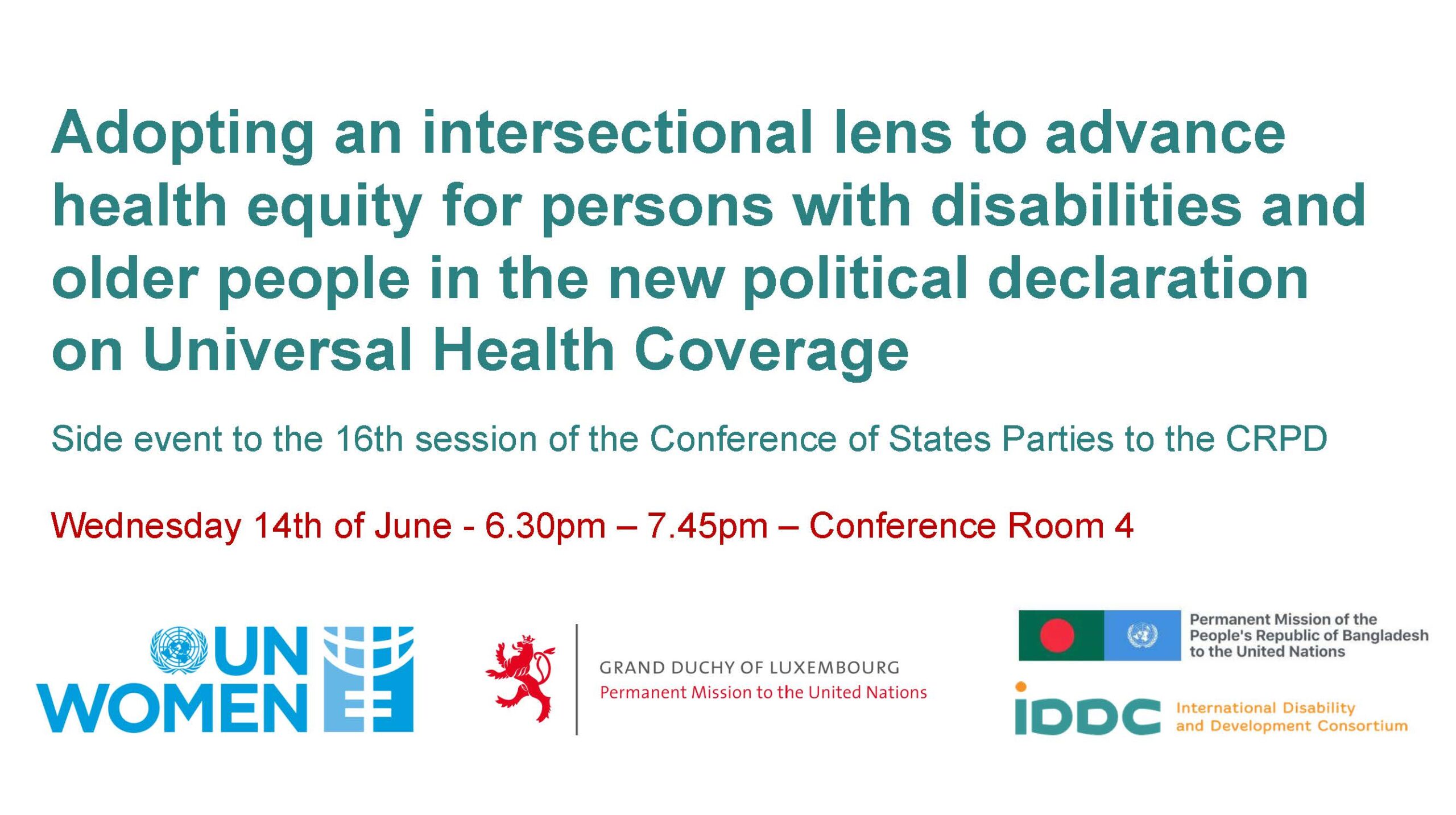Adopting an intersectional lens to advance health equity for persons with disabilities and older people in the new political declaration on Universal Health Coverage (UHC)
New-York, 14 June 2023. UN Women, the Permanent Missions of Luxembourg and Bangladesh, and the International Disability and Development Consortium organised a side-event on “Adopting an intersectional lens to advance health equity for persons with disabilities and older people in the new political declaration on Universal Health Coverage” as part of the 16th Conference of State Parties to the CRPD. The event aimed at exploring the barriers persons with disabilities of all ages face to enjoying their right to health taking an intersectional lens, considering synergies between those working on disability, gender and ageing and identifying opportunities at global, regional and national levels to advance CRPD and health equity in the UHC agenda.
In the 2019 UN political declaration on Universal Health Coverage (UHC), governments committed to ensuring no one is left behind and to reaching the furthest behind first in advancing UHC, reflecting principles of equality and non-discrimination. Yet, with multiple and intersecting barriers to realising their right to health, 1.3 billion persons with disabilities continue to experience lower quality services or find the healthcare they need is inaccessible and unaffordable. Consequently, they face much poorer health outcomes than people without disabilities. Intersecting factors such as sex, age, gender identity, race, poverty or migrant status further intensify health inequities experienced by persons with disabilities, often as a result of multiple forms of discrimination that remain poorly addressed in health systems and services. UHC will only be achieved through concerted action to tackle these inequities across the continuum of care, with specific investments to reach groups at the highest risk of being left behind. This means taking action to make health systems more inclusive through people-centred and whole of society approaches founded upon primary health care – actions that benefit everyone.
Our representative of the Civil Society Engagement Mechanism (CSEM) Smitha Sadasivan made clear how important it is to use the intersectional lens, if we talk about UHC :
“Yet, myself being a woman with a rare disease and disability, living with aged parents and working from community based collectives at the grassroots level as well as being part of discussions at the global level, I see a lot of scope for improvement in the context of Inclusion and intersectional focus with regard to gender, persons with disabilities and the older population.
There are excellent instruments, documents, strategies, tools and reports on, inclusion of different vulnerable groups by the UN agencies and other international actors, which also seem to result more often in compartmentalized actions rather than holistic inclusion of all. This is also evident with incountry policies and programs where the women and child welfare department doesnt cater to the essential needs of women with disabilities or elderly women; And health policies being non inclusive of disability related health services, assistive technology or SRHR services for women with disabilities.”
As the global community prepares for the High-Level Meeting in September, there is growing anticipation and appreciation for the renewed commitment to Universal Health Coverage. IDDC, represented by Marion Lieser, CEO of Light for the World, welcomed the leadership of Guyana and Thailand, along with co-sponsoring and supportive Member States, in developing a Political Declaration on UHC as a significant step towards improving healthcare access and outcomes for all.
She highlighted the positive points of the current draft:
- it reaffirms the fundamental right of all persons with disabilities to the highest attainable standard of physical and mental health;
- it recognises the inequalities and barriers that persons with disabilities face in the realisation of this right; and
- it commits Member States to reach the ones furthest left behind first through community-based, people-centred, gender- and disability-responsive interventions.
However, there are currently two main shortcomings. The Political Declaration should use human rights-based language more consistently with explicit references to the universal right to health-related goods, facilities, services and information that are available, accessible, acceptable and affordable. In addition, the Declaration needs to recognise the urgent need for increased public financing for disability-inclusive UHC. Without financial backing, the Political Declaration will just remain a statement instead of a pivotal turning point for disability-inclusive UHC.
Marion concluded her intervention by emphasizing IDDC’s intention to use the Political Declaration together with international, regional and national OPDs in order to support governments to establish UHC in their health systems, mobilise civil society around health equity, and to draw inspiration for our own programmatic work. In order to do so, compliant with the CRPD and substantial financing are key.
Statement from Smitha Sadasivan

